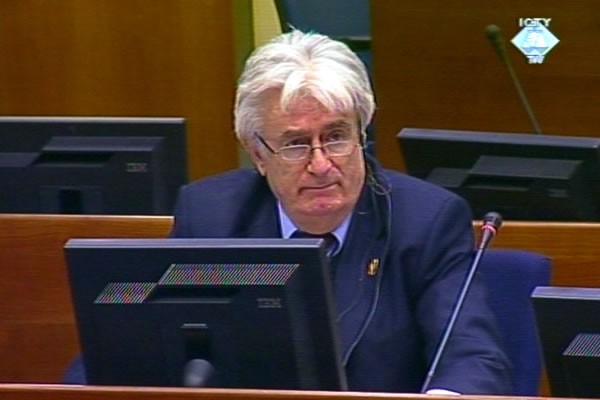Home
EXPELLING MUSLIMS AND CROATS FROM GRBAVICA
Former soldier in the VRS Sarajevo-Romanija Corps is testifying at the trial of Radovan Karadzic. The witness spoke about the Serb police and military expelling the Croats and Muslims. According to the witness, the propaganda spread by Karadzic and other Serb politicians that Croats and Muslims were ‘a threat to Serbs’ and that ‘co-existence was impossible’ contributed significantly to inter-ethnic hatred
 Radovan Karadzic in the courtroom
Radovan Karadzic in the courtroom At the trial of Radovan Karadzic, the prosecution today called to the witness stand yet another ‘insider’, a former soldier in the VRS Sarajevo-Romanija Corps who is testifying under the pseudonym KDZ 310 and with image and voice distortion to protect his identity. During the war, the witness lived in the Sarajevo district of Grbavica. The witness described how the Serb police and military abused and expelled non-Serb civilians from Grbavica.
According to his written statement read out by the prosecutor in court today, in September 1991, the witness realized that after withdrawing from Slovenia and Croatia, the JNA handed over a huge quantity of weapons and ammunition to the Serb Democratic Party. By April 1992, the JNA had set up artillery positions around the city.
On the basis of what Karadzic and other Serb politicians were saying, the witness concluded that ‘anti-Muslim and anti-Croat’ propaganda’ fomented by the SDS leaders contributed significantly to inter-ethnic intolerance. Karadzic and other Serb politicians said that those two nations were ‘a threat to Serbs’ and that ‘co-existence was impossible’.
In a speech in January 1991 Karadzic paid tribute to the Serb victims from World War II; in the same speech, he said that the Serbs were the ‘only nation persecuted and killed only because it exists’. According to the witness, this was an example of inciting inter-ethnic hatred. Replying to the prosecutor, the witness said that Karadzic and other political leaders didn’t have the right to decide who would live with whom. It was up to the nations to decide. ‘We could compete in sports or in literature, but not in who would kill more people’, the witness said.
The prosecutor brought up Karadzic’s interview to Belgrade newspaper Borba of 16 April 1992. In the interview, Karadzic says that the Serbs would never find peace until they achieve their age-old aspiration to live in a single state. ‘Karadzic was a charismatic personality and people trusted him and believed it was attainable’, the witness said.
In the cross-examination, Karadzic tried to show that the Muslims – and not the Serbs – were preparing for the war in BH; he claimed that by September 1991 they already had about 100,000 soldiers. A large number of those soldiers were stationed in the Novo Sarajevo municipality. Grbavica was a part of that municipality. The witness however was adamant that Grbavica ‘fell’ into the Serb hands without any resistance, adding that he didn’t see any Green Berets or other Muslim forces there.
What he saw, the witness repeated, was the forcible expulsion of non-Serb civilians who were made to leave Grbavica in columns. Karadzic argued that the witness’s claim was false; according to him, there were no expulsions but ‘exchanges’ of population. As Karadzic put it, ‘whole world would have known’ if civilians had indeed been expelled en masse.The witness said he saw with his ‘own eyes’ and on TV that people were being expelled. The prosecution corroborated this claim in the re-examination by showing broadcasts from Belgrade and Sarajevo TV about the expulsion of Muslims and Croats from Grbavica.
The trial of Radovan Karadzic for genocide and other crimes in the war in BH continues on 7 December 2010.Linked Reports
- Case : Karadzic
- 2010-11-11 KARADZIC WANTS TO QUESTION FRENCH GENERAL
- 2010-11-05 ‘LET THERE BE JUSTICE, THOUGH THE WORLD PERISH’
- 2010-11-04 MORE MONSTROUS THAN CRIME ITSELF
- 2010-12-07 RANDOM SHELLING OF SARAJEVO
- 2010-12-08 KARADZIC’S SUSPICIONS ABOUT MARKALE
- 2010-12-09 KARADZIC REFUSES TO BUDGE ON CLAIMS ABOUT ‘STAGED’ MASSACRES
